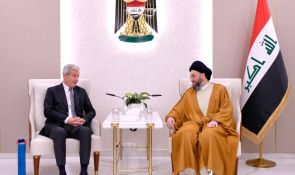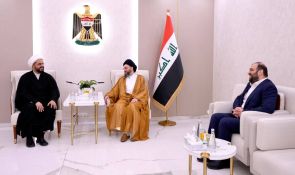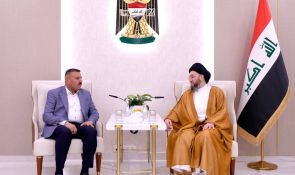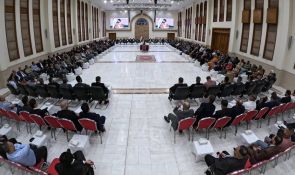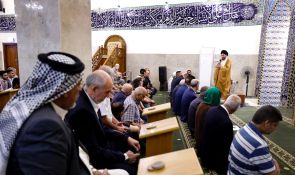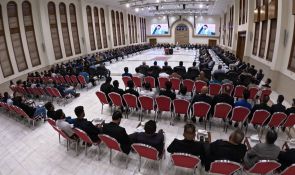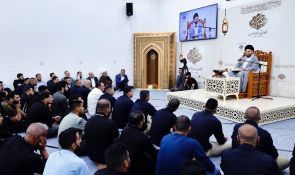SAYYID AMMAR AL-HAKIM: “The general public is the support, dignity and strength; through them does Allah Almighty support His religion and servants.”
Our talk in the past weeks was about the Islamic theory of administration and leadership. We stated that the covenant of the Commander of the Faithful Ali (Ú) to Malik al-Ashtar summed up that theory. We reached in discussing this covenant the seventh chapter in which the Commander of the Faithful (Ú) talks about the nature of government’s priorities, that there is always an argument and an intersecting between the interests of the people and citizens [on the one hand] and the interests of the trains and seekers of personal interests who surround an official [on the other], that an official has to give preference for one of these interests over the other: He either follows the wishes of his train, the people who are close to him, or he goes in the direction of fulfilling the wishes and interests of the general public in the area of his responsibility which may straiten or broaden.
Among an official’s characteristics: middle grounds, equity and pleasing the public…
In past weeks, we quoted the statement of Imam Ali (Ú) in which he says, “Le the thing you love the most be what the middle grounds in righteousness.” The Commander of the Faithful (Ú) submitted a number of principles: the middle grounds in righteousness, neither extravagance nor strictness nor pressure on the citizens, and there should be no leniency to the extent of having consequences: It is not following the law to the letter in a way where it is difficult to carry out and surrender, nor is it, on the other hand, taking the law lightly, something which maintains no sanctity for the law and state; rather, it is achieving middle grounds regarding doing what is right.
“… and the most general when it comes to justice”: There must be generality in justice, in projects, steps, concessions and opportunities. Do not give some while looting from others. You must be fair in the steps which you undertake. “… and what is most general for achieving the subjects’ pleasure”: these steps in administration, while you are in charge, must achieve what i the most common, the widest range of people. An official cannot please most people because there are special interest seekers among humans, those who have personal expectations and seek concessions. So, no matter how one may be, even if he reaches the stage of infallibility, such as the Messenger of Allah (Õ), he will not be able to please all people. The Islamic state was limited; it was the city of the Prophet (Õ) where scores of people were, but the Qur’an talks to us about the hypocrites and those who was not in harmony with the Messenger of Allah (Õ). So was the case during the time of Ali (Ú). If the ruler is on the level of the Messenger of Allah (Õ) and on that of the Commander of the Faithful (Ú), yet he cannot achieve everyone’s consensus and acceptance because some people are themselves the problem, the fault is not with the ruler, but he tries to please the majority and win their acceptance.
Then the Commander of the Faithful (Ú) moves to determine this phenomenon and settle this argument between the public and personal interest saying, “The anger of the majority undermines the pleasure of the minority.” When the majority is angry, there will be demonstrations, protests, indignation, comments, remonstration, a trust crisis and a gap with the official…, this undermines the pleasure of the minority. The pleasure of the minority dissipates and is lost by the anger of the general public. The official must realize this fact which is: Are the majority of the people fair, understanding and pleased with the situation or not? If they are, everything is fine; otherwise, the pleasure of the minority will be lost when the masses are angry.
“The anger of the minority is forgiven by the pleasure of the majority.” On the other hand, if the people are pleased with the situation, there will be building, reconstruction, services, work opportunities and the like, and people are at ease. But there is a small number of the official’s elite group that are not happy with the situation, the elite who have their interests and privileges. These are not pleased in this case, and it is alright. The elite group is angry. This anger is forgiven when the majority of people are pleased. Now, when we evaluate whether the ruler is successful or not, if people are pleased or not, there is a small number of interest seekers in their own halls and they have their own viewpoint. We see that nobody stops there, but if the people are not pleased, no matter how much praise and lauding the minority piles up, it does not change anything of the reality. Therefore, the foundation is comprised by the people, not the aristocratic class.
The Commander of the Faithful (Ú) says that an official must be biased to the majority of people, not to the few elite.
He starts describing this train, these interest seekers, the elite… Reviewing these characteristics explains the reason for tilting the scales in favor of the majority, not of the minority…
Characteristics of the train, interest seekers and elite groups…
“Nobody among the subjects weighs heavier on the ruler when it comes to prosperity.”
FIRST: “… heavier on the ruler when it comes to prosperity.” These elite groups are there during times of ease and comfort, when life favors the ruler, the governor. During the condition of prosperity, these folks form a heavier burden on him, for they want big concessions and resources from the ruler…
SECOND: They weigh lighter on him during the time of affliction. When there is a crisis or an accusation directed to the official, these folks withdraw themselves from this official who fears for himself. When a problem takes place, you will find none of these folks around, everyone produces an excuse and abandons the official, and the official has to know this fact.
THIRD: They hate fairness the most… They do not desire equality and fairness, regarding themselves as being above the rest of the citizens.
FOURTH: They persist in asking… They keep insisting, always trying to gain some benefit from the official to serve their personal interests. Such is their characteristic. It never changes during ages and throughout history, at all times and everywhere.
FIFTH: They are the least in expressing gratitude when given… When you give him something, he does not thank and appreciate. Most plots to which the officials are exposed are there when they see that there have been those whom they helped, assisted and favored deny the bliss and forget the kindness.
SIXTH: They are the slowest in accepting excuses when they are not given… One does not accept an excuse when you do not assist him, do him a favor or solve a problem for him. He is slow in accepting excuses. He is not concerned about the problems that happen to the official, or whether this official loses his Hereafter, if his reputation is tarnished, his status shaken…, what is important is what he himself gains.
SEVENTH: He is the least patient person during tough times. When life’s scales turn upside-down, when life abandons an official or rule and a problem happens, he is the least of all people in being patient and the least useful.
These are the seven characteristics of this elite group, the aristocratic class, the class of benefit seekers who stick to the official. they are a problem during prosperity. They are a disadvantage, a calamity on you, O official, yet during times of hardship you find none of them beside you. They leave your back exposed and not protect or defend you. These folks are unreliable. Reliance must be on the general masses of the citizens. These stand truthfully beside you. Then the Commander of the Faithful (Ú) reviews their general characteristics and features, stressing his preferential viewpoint.
Features and characteristics of the general masses…
- They are the pillar of the creed, the public. The general public are the pillar of the creed: When there is a problem or challenge, these masses are relied on; they are the basis and the pillar.
- The majority of the Muslims… These are the majority, the Muslim masses, and they outnumber others, the ones who were buried at mass graves, jailed and placed in cells. They are the ones who stand on the fields of Jihad and battlegrounds. When tough times get tougher, when wars are waged, when calamities fall, these are the ones who stand, defend and support. The official must choose who stands beside him during the time of hardship, of tribulation, not those who abandon him and run away. Those who stand by your side, O official, are the citizens, the public, not that opportunist and interest seeking class of people.
- Preparations to meet the foes… When the war intensifies, when the foes stand in ranks, the supplies and ammunitions in this battle are the public, the masses, those who sacrifice, who conduct Jihad. Their expectations are few, their benefits are many. These form a light burden, yet their benefit is great. If an official is able to please the majority of these citizens, this will be success itself. As for others, the elite groups, when they see the general public while most of them are pleased, they, too, harmonize with the trends of the majority of people. But nobody can please the special elite group of interest seekers who leave the official by himself during crises. Also, the public will not be angry with you, O official, so you will lose everything.
In any measure or decision, the interests of the majority of people must be looked after, not those of the special groups.
“Let your innermost be with them.” As long as these masses stand by your side, defend, support and assist you, you must pay them your attention and look after them. “Your inclination must be towards them.” You must take care of them. The Messenger of Allah (Õ) used to be invited to banquets held by senior merchants and dignitaries, but he always preferred the tables of the poor and of the general public because the Messenger of Allah (Õ) was reading between the line in the first group’s invitations. He knew that the public masses are the pillar, the dignity and the strength. Through them does Allah Almighty support His creed and servants. The official must choose one of these two options. The Islamic way, that of Ali (Ú), was that one should choose to please the general public in any step and in any law. In any official, in any measures, the interest of the majority of people must be taken into consideration, not that of the special interest groups. “If it is as such, rely on Allah.”
Reliance (on Allah), seeking the middle grounds, moderation and serving public interests represent one of the most important secrets for success in the leadership network…
The Holy Qur’an, too, stresses this fact clearly. In Surat al-Kahaf, verse 28, He says, “And keep your soul content with those who call upon their Lord morning and evening, seeking His face, and do not let your eyes pass beyond them, seeking the pomp and glitter of this life; nor obey any whose heart We have permitted to neglect our remembrance, one who follows his own desires and whose case has gone beyond all bounds” (Qur’an, 18:28).
This verse explains that those who fear lest they should anger Allah Almighty, remembering Him at all times and seeking His pleasure, must be supported, and one must stand on their side. They have no special interest, and they have no pursuits. These people must be backed, looked after and taken care of. Do not turn away from them, leave them and go somewhere else due to your lusts for those who praise and laud you, for this praising and lauding does not represent anything compared to the public’s pleasure with you; this is what is important. Do not leave the people whose hearts are pure and go to those who are living indifferently about Allah Almighty, distantly from the values and principles which Allah Almighty wants. One must stick to the general masses of people who want goodness, righteousness, constructing. One must keep himself distant from those with special interests, those who go to extremes, who indulge in false issues. The official must rely on the support of the people who adopt the middle grounds and moderation, serving the public interests. This represents one of the most important secrets of the success of the leadership network when one turns to those on whom he can rely, those who would support him, those whom he considers when he legislates and undertakes ensuring suitable decisions and measures. This is a great lesson, one of those of Imam Ali (Ú) in administration and leadership.


